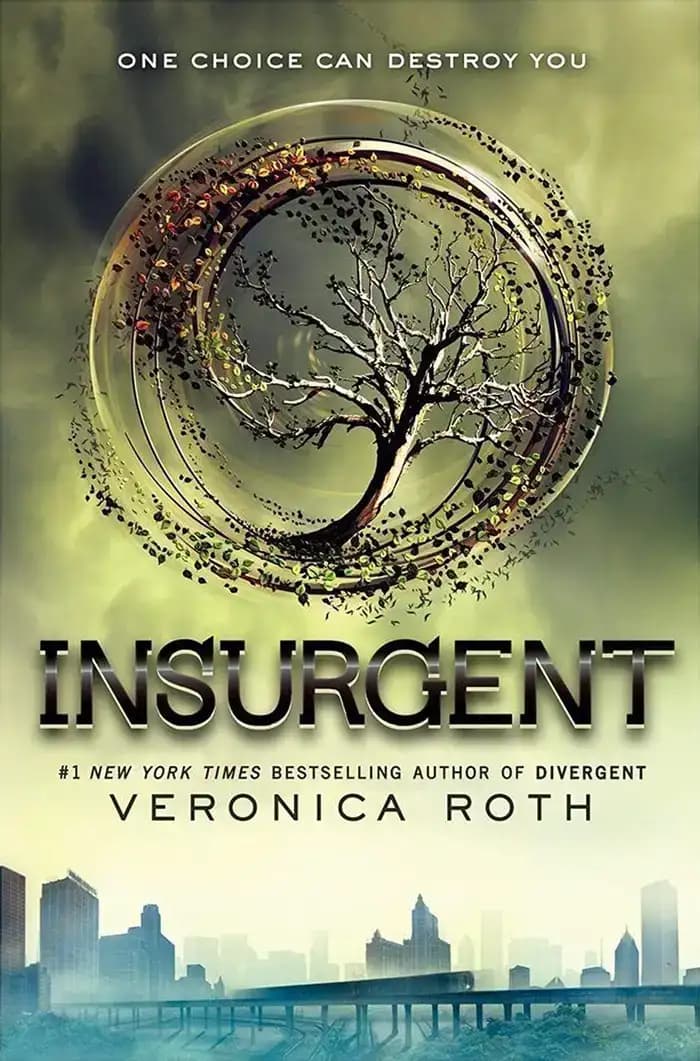Insurgent
#2 of 3 in The Divergent Series
on Goodreads (1,574)
What’s inside...
One choice can transform you—or it can destroy you. But every choice has consequences, and as unrest surges in the factions all around her, Tris Prior must continue trying to save those she loves—and herself—while grappling with haunting questions of grief and forgiveness, identity and loyalty, politics and love. Tris's initiation day should have been marked by celebration and victory with her chosen faction; instead, the day ended with unspeakable horrors. War now looms as conflict between the factions and their ideologies grows. And in times of war, sides must be chosen, secrets will emerge, and choices will become even more irrevocable—and even more powerful. Transformed by her own decisions but also by haunting grief and guilt, radical new discoveries, and shifting relationships, Tris must fully embrace her Divergence, even if she does not know what she may lose by doing so. New York Times bestselling author Veronica Roth's much-anticipated second book of the dystopian DIVERGENT series is another intoxicating thrill ride of a story, rich with hallmark twists, heartbreaks, romance, and powerful insights about human nature.
Character compass
Beatrice 'Tris' Prior
Christina
Tori Wu
Uriah Pedrad
Four (tobias Eaton)
Johanna Reyes
Jeanine Matthews
Evelyn Johnson-Eaton
Caleb Prior
Eric
Marcus Eaton
Peter Hayes
Peter
Drew Leighton
Natalie Prior
Molly Atwood
Beatrice Prior
Tobias Eaton
Albert
Discussion points
How do you think Tris's choices reflect her own beliefs and values, and how do they impact those around her?
What does the idea of 'faction before blood' mean, and how do the characters in the book grapple with this concept?
In what ways do Tris and her allies challenge their society's norms, and what can we learn from their courage and determination?
How do the different factions represent different aspects of human nature, and which faction would you choose to belong to and why?
What role does forgiveness and trust play in the story, and how do these themes relate to the real-world relationships?
Tip: Role play these questions
Encourage your child to compare and contrast the different factions within the book and ask them which faction they relate to the most and why.
Discuss the importance of standing up for one's beliefs and how sacrifices might be necessary when fighting for change, drawing parallels to historical or current events.
Explore the emotional and moral dilemmas Tris faces and ask your child how they would react in similar situations.
Highlight the significance of teamwork and alliances in the book, prompting your child to share experiences where collaboration led to success in their own lives.
Ask your child about the concept of trust portrayed in the book and discuss its importance in personal relationships and society.
Key lessons
Example Lesson: Resilience in adversity
Explanation: The protagonist, Tris, faces numerous challenges and dangers throughout 'Insurgent'. Her courage and ability to persevere serve as a central theme.
Real-World Application: Children learn the importance of standing strong even during difficult times, which can be applied in overcoming personal challenges at school or in their community.
Example Lesson: The significance of choices
Explanation: Throughout 'Insurgent', Tris makes several critical decisions that affect not only her fate but also the lives of others around her. These decisions underscore the theme of personal responsibility and self-determination.
Real-World Application: This lesson can teach children about the impact of their choices on their lives and instill a sense of responsibility when making decisions.
Example Lesson: Value of alliances and teamwork
Explanation: Tris learns to collaborate with others, even those she does not fully trust, to fight against a common enemy. This cooperation highlights the importance of teamwork.
Real-World Application: Children can apply this by learning to work cooperatively in group settings, whether in sports teams, classroom projects, or family activities.
Example Lesson: Questioning and challenging authority
Explanation: In 'Insurgent', Tris challenges the status quo and questions the motives of leaders who misguide their people. This reflects critical thinking and the pursuit of truth.
Real-World Application: This encourages children to seek their own answers and question inconsistencies, promoting intellectual independence and critical thinking skills.
Example Lesson: Embracing diversity and differences
Explanation: As factions clash, the story highlights the problems of division while illustrating the strength in diversity and acceptance.
Real-World Application: Children learn to embrace and celebrate differences among their peers, fostering a more inclusive and supportive community environment.
